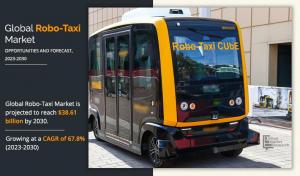Ride‑Hailing Reinvented: Robo‑Taxi Industry to Grow from USD 1 billion in 2023 to USD 38.6 billion by 2030
Surge in requirement for road safety & efficient traffic control and rise in demand for emission free & fuel-efficient vehicles fuel the growth of the global robo taxi market. On the other hand, several cyber security threats and expensive R&D costs required for proper implementation restrain the growth to some extent. However, supportive government strategies and smart city development programs are expected to usher in lucrative opportunities in the near future.
Download Report Sample at https://www.alliedmarketresearch.com/request-sample/6126
Robo-Taxi is an autonomous car, operated for an e-hailing service. A Robo-Taxi, also known as a Robo-Cab, is a driverless taxi or a self-driving taxi. Its primary purpose is to eliminate the need for human chauffeur, which is a significant part of the operating costs of these types of services. With the use of Robo taxi, maximum fuel efficiency is obtained. It also reduces chances of accident. The rising emission concerns, increasing issues over road safety, and surging demand for ride-hailing services are the major factors fueling the robo taxi market. Robo-taxi requires a better and efficient artificial intelligence network to operate the vehicle which supplements the growth of the market across the globe. The increased automation in vehicles has led to the growth of autonomous vehicles across the globe, which has also fueled the robo taxi market.
A safer ride provides comfort to the passengers, minimizes the chances of accidents that occur due to human errors and increases the passenger capacity and increasing the robo-taxi outlook among customers through its features and efficient driving. Robo-taxis are responsible for quality of rides and is efficient in travelling to a specific distance by reducing the road traffics. With increased demand for alternative means of transport across the globe, the demand for robo-taxis has increased, which in turn boost the growth of the global robo taxi market.
The goods transportation segment to dominate by 2030-
By application, the goods transportation segment is expected to peg at nearly three-fifths of the total market revenue in 2023, and would continue to rule the roost throughout the forecast period. The passenger transportation segment, on the other hand, would grow at the fastest CAGR of 74.2% during the study period.
Interested to Procure The Data? Inquire here at https://www.alliedmarketresearch.com/purchase-enquiry/6126
The camera segment to maintain the lion’s share by 2030-
By component, the camera segment is expected to account for more than one-fourth of the total market share in 2023, and would retain its dominance by the end of 2030. At the same time, the ultrasonic sensor segment would cite largest CAGR of 75.5% throughout the forecast period.
North America would bring in the highest share in 2023-
By geography, North America would hold the major market share in 2023, generating more than two-fifths of the global market. Simultaneously, Europe is projected to manifest the fastest CAGR of 75.6% during the estimated period. The other two regions analyzed in the report include LAMEA and Europe.
Brazilian Security Firm Vanguard Attaché Launches Elite Protection Service
Durham Therapists Announces All-New 'Top 10 Best Therapists in Durham, NC' List for 2025
MindStir Media Named No. 1 Among Top Book Marketing Companies
Więcej ważnych informacji
 Jedynka Newserii
Jedynka Newserii

 Jedynka Newserii
Jedynka Newserii

Handel

Polskie MŚP otrzymają większe wsparcie w ekspansji międzynarodowej. To cel nowej inicjatywy sześciu instytucji
Firmy z sektora małych i średnich przedsiębiorstw otrzymają kompleksowe wsparcie na potrzeby zwiększania konkurencyjności na arenie międzynarodowej. Taki jest cel wspólnej inicjatywy instytucji zrzeszonych w Grupie PFR pod szyldem Team Poland. Obejmuje ona zarówno wsparcie kapitałowe, w postaci gwarancji, pożyczek czy ubezpieczenia, jak i doradztwo oraz wsparcie promocyjne i informacyjne, dzięki czemu mikro-, małym i średnim firmom łatwiej będzie podjąć decyzję o ekspansji zagranicznej. Pierwszy projekt dotyczy wsparcia dla firm zainteresowanych uczestnictwem w odbudowie Ukrainy.
Bankowość
RPP zgodna co do potrzeby obniżania stóp procentowych. Trwają dyskusje dotyczące tempa tych decyzji

W lipcu Rada Polityki Pieniężnej po raz drugi w tym roku obniżyła stopy procentowe, określając swój ruch mianem dostosowania. W kolejnych miesiącach można oczekiwać kolejnych obniżek, ale ich tempo i termin będą zależeć od efektów dotychczasowych decyzji i wzrostu płac. Docelowo główna stopa procentowa ma wynosić 3,5 proc. Te okoliczności sprzyjają kredytobiorcom.
Handel
Umowa z krajami Mercosur coraz bliżej. W. Buda: Polska nie wykorzystała swojej prezydencji do jej zablokowania

– Polska podczas prezydencji w Radzie UE nie wykorzystała szansy na obronę swoich interesów w sprawie umowy z krajami Mercosur – ocenia europoseł PiS Waldemar Buda. W jego ocenie polski rząd, mimo sprzeciwu wobec zapisów umowy, nie zbudował w UE sojuszy niezbędnych do jej odrzucenia. Porozumienie o wolnym handlu spotyka się przede wszystkim z protestami europejskich rolników, którzy obawiają się zalania wspólnego rynku tańszą żywnością z krajów Ameryki Południowej. Według europosła wszystko może się rozegrać w najbliższych tygodniach.
Partner serwisu
Szkolenia

Akademia Newserii
Akademia Newserii to projekt, w ramach którego najlepsi polscy dziennikarze biznesowi, giełdowi oraz lifestylowi, a także szkoleniowcy z wieloletnim doświadczeniem dzielą się swoją wiedzą nt. pracy z mediami.




![Część środków z Planu Społeczno-Klimatycznego trafi na walkę z ubóstwem transportowym. Organizacje branżowe apelują o zmianę priorytetowych projektów [DEPESZA]](https://www.newseria.pl/files/1097841585/rower3,w_85,_small.jpg)




.gif)

 |
| |
| |
|